Feng Shui Plant Ideas For A Wealthy Office {Lucky Plants Only!}
-
Chris Dosser
- November 13, 2021
If you buy something using the retail links in our articles, sometimes we earn a small affiliate commission. This does not impact the products we recommend.
The primary culture that ascribes ideas of luck to plants, and all other elements of the home, is Feng Shui, the ancient Chinese tradition that works to optimise the space you live in.
In terms of Feng Shui, a lot of emphasis is placed on the shape of the leaves of a plant. Rounded leaves, like on a jade plant signifies coins which equate to wealth and prosperity.
Conversely, plants that have thorns or points are understood to be energy killers, hence the reason why Mother-in-Law’s Tongue is a controversial choice.
Any plant that is good at purifying the air around you is also seen as lucky. They draw out toxins and negative energy from the world around you so finding a good air purifier that has rounded leaves, like tulsi is handy indeed.
Some Feng Shui plants that are thought to help create a wealthy home office include:
- Lucky Bamboo – Dracaena sanderiana
- Money tree – Pachira aquatica
- Jade Plant – Crassula ovata
- Snake Plant – Dracaena trifasciata
- Potted Orchid – Phalaenopsis orchids
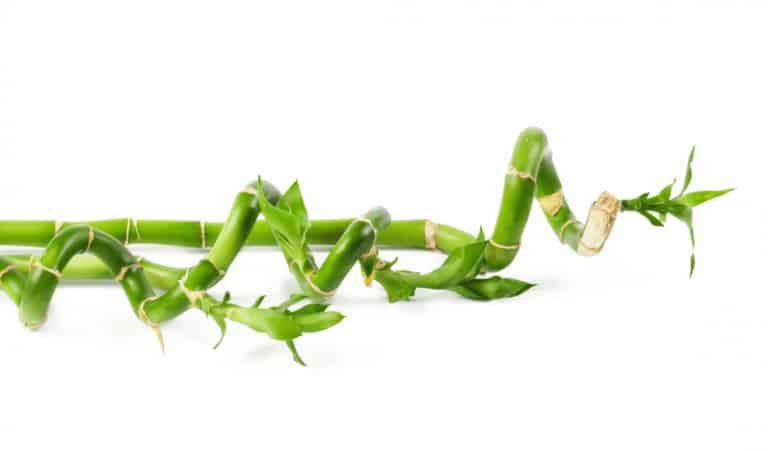
Lucky Bamboo – Dracaena sanderiana
Seen as lucky in both Feng Shui and Hindu and Indian culture, the lucky bamboo plant has a lot of ideals attached to it. You’ve probably seen them around – a bunch of green stalks in decorative pots and stones around the base.
The reason bamboo stalks are seen as lucky is because they represent the harmony of the elements in Feng Shui – water, wood, fire, earth, and metal.
It’s important that you tie a red ribbon around one of the stalks, and also use a red ribbon to tie a coin around a stalk. These decorations are for fire and metal elements.
What type of luck this houseplant brings all depends on the number of stalks you have in your arrangement.
In Hindu culture too, bamboo plants are thought to usher luck into your home.
To get the best out of your lucky bamboo houseplant, place it in the right place in your office. For good luck in your family, place it to the east of your office or desk, to get lucky with your money, it belongs in a south-easterly direction.
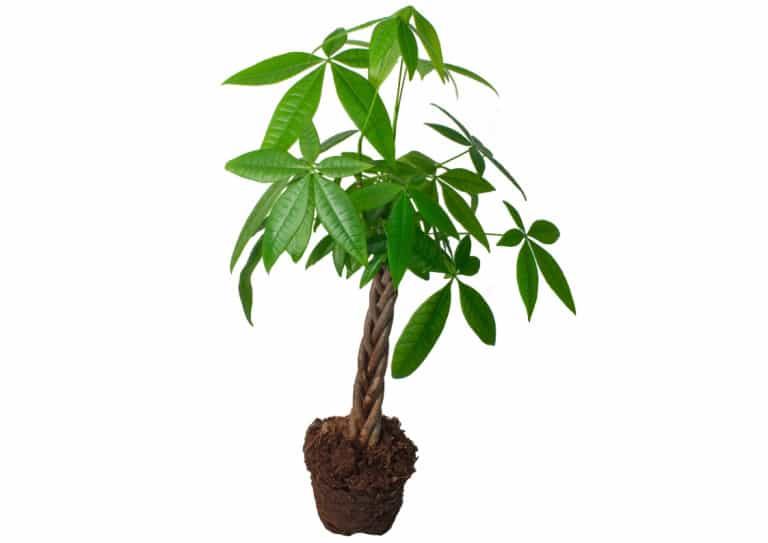
Money tree, Pachira aquatica
Although from Central and South America, this plant is very auspicious in Feng Shui. As the name might suggest, a money tree is thought to attract money and wealth wherever it is and also brings luck.
The south east is the direction for money in Feng Shui so that is the area of the room or your desk that the plant needs to go on.
When you look at buying a money tree to bring your office luck, make sure you get one with a braided trunk. Five stalks is the luckiest configuration. This is seen as luck because it’s tying the wealth into place. Leaves with five points on the plant are extra lucky, too.
There’s a cute story about how the money plant became lucky. Legend has is that a farmer was in his rice paddies one day and came across a small and beautiful tree. He took the tree and started growing more of them to be able to see them wherever he worked. He subsequently became a very wealthy man thanks to his luck of finding the tree in the first place.
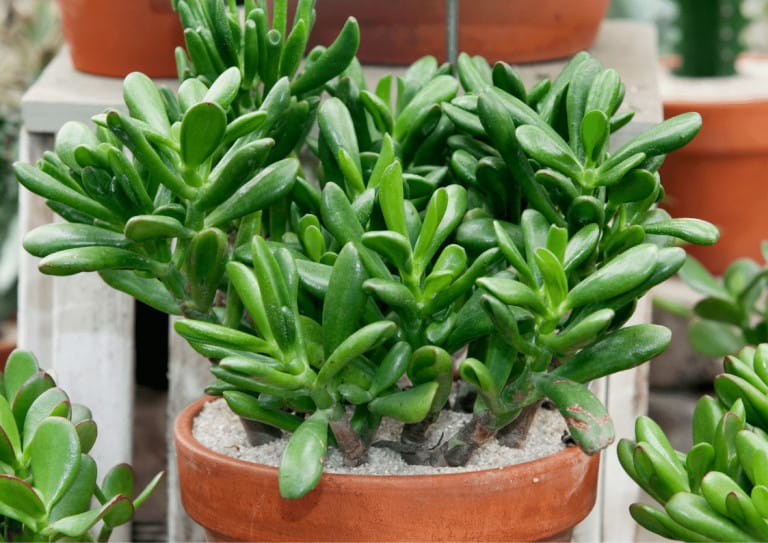
Jade Plant, Crassula ovata
Being an evergreen plant, the jade plant is a symbol of permanence.
The energy that flows through your home, according to Feng Shui, will be locked down by the presence of the jade plant. This is a good thing, as long as the energy, or Chi, you’ve got flowing is good and powerful.
Jade plants are a succulent so really easy to look after. You don’t need to give them too much attention, they’ll just happily keep bringing you luck in your office. Ideally, you’d place the jade plant near the entrance of your office, but if that’s not practical, the south east corner is the next best location.
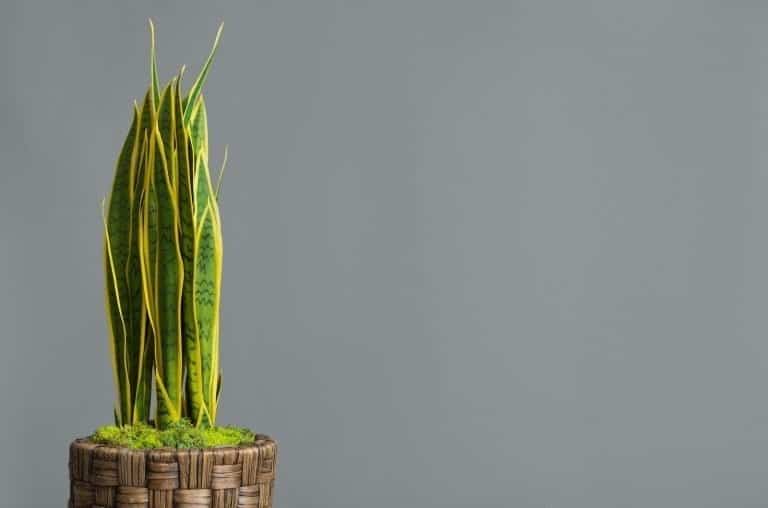
Snake Plant, Dracaena trifasciata
You might already know about the Snake Plant or Mother-in-Law’s Tongue. It’s pretty indestructible as far as house plants go. It can take a fair bit of neglect and still be there looking green and lovely. It’s also really effective at filtering out pollutants from the air, which is rather lucky if you have a city-based home office.
This plant is a little controversial in terms of Feng Shui.
Some would say that it’s negative because it’s got a sharp shape. Others argue that it’s a positive shape, always reaching up and growing. If you’re unsure on the luck for your home office in this houseplant, put it in a secluded spot so that it’s present but not easily interfering with your Chi.
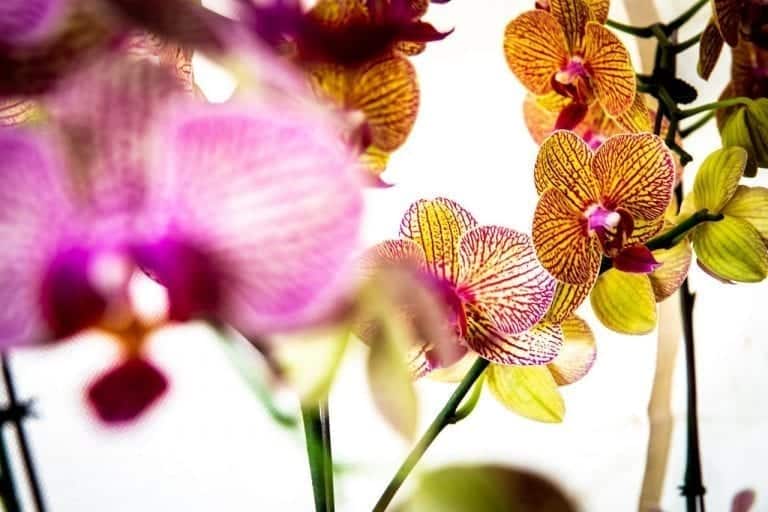
Potted Orchid, Phalaenopsis orchids
You’ll get year-round blooms with your potted orchids. They’re fairly easy to take care of but are seen as being representation of perfection, what luck! It’s believed in Feng Shui the luck bought by the potted orchid is to enrich your relationships and have a nurturing effect.
Different colours of orchid blooms represent different types of luck. Here’s what they mean:
- Violet blooms are the most auspicious in general
- Pink blooms are passionate and bring harmony to relationships
- White blooms will bring a sense of calm and clarity as well as a peaceful innocence
In terms of placement, once again it’s suited to either the east or south east of the area you’re decorating.
Is it beginning to feel like the south east corner of your desk is going to be overrun with plants?
Don’t worry, we’re going to switch tangents to look at some plants considered lucky in the Hindu tradition that don’t require any special placement.
As a belief system, Hinduism too is very much in touch with nature and the world that surrounds us.
It’s filled with symbols and ideas that are very different to Western culture. If you’d like to bring some of the good luck and positive energy that’s understood in Hindu and Indian culture, here are some house plants you can consider.
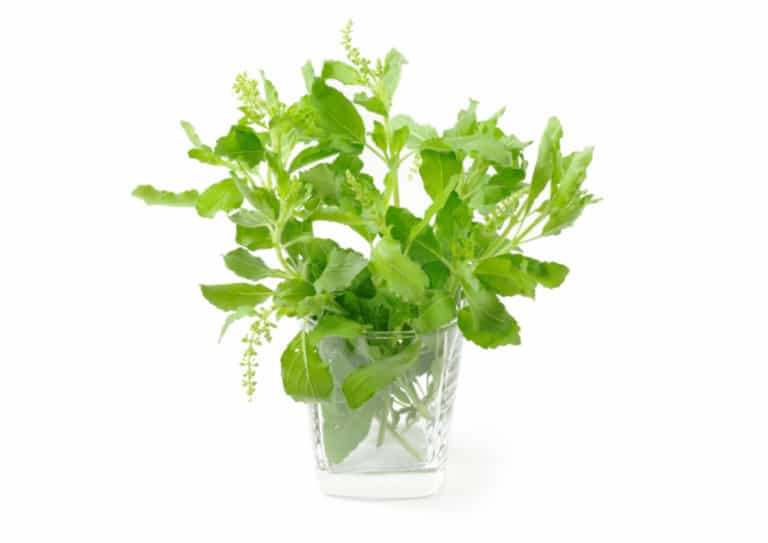
Tulsi, or Holy Basil, Ocimum tenuiflorum
Having multi-purpose items in your office is always useful, so having a multi-purpose plant would be an appropriate addition. A Tulsi plant will bring luck to your office as well as give you an extra herb to add to your cooking repertoire.
Tulsi is considered one of the luckiest plants in Hinduism and lots of different properties are ascribed to it. A lot of its properties are to do with purification, such as:
- Healing coughs and colds
- Being antibacterial
- Removing blood toxins
- Purifying the digestive tract
- Cleaning the air
As well as keeping negative energy at bay.
Whatever the reason you choose to have it in your home office, luck should be on your side. You’re also going to get gentle, sweet aromas from the plant and can add leaves to your cooking after you finish your day in your home office.
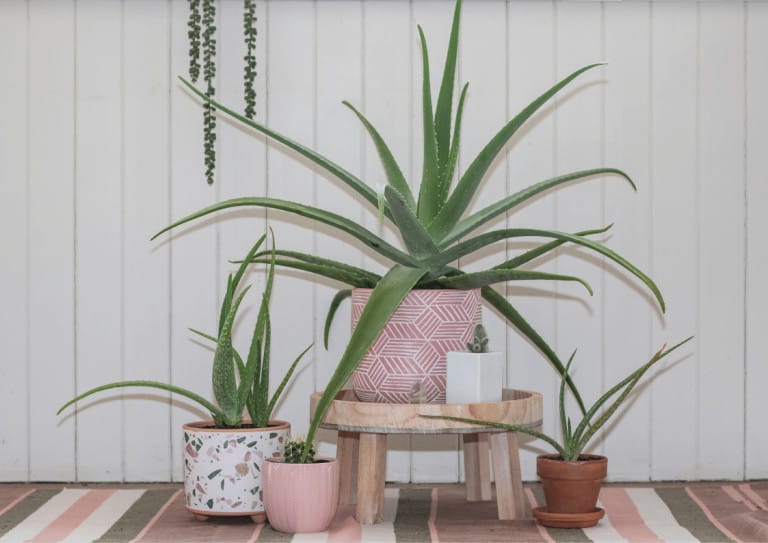
Aloe Vera, Aloe barbadensis miller
The plant itself is hardy – there’s little chance that you’d ever kill it, except by overwatering. Whenever you might need some, just slice off a stalk and squeeze out the juices from the middle. Having something that will help keep your skin fresh and health in your home office is definitely lucky.
Wrapping up
We could all use a little luck sometimes, so bringing plants into your office to bring you a little something special is a good idea. You’ve now got plenty of ideas for lucky indoor houseplants for your office desk, plus some guiding principles if you’re not a fan of our picks.
Whether you want something completely decorative like lucky bamboo, or a multi-functional lucky office plant like holy basil, now you know what to look for when you go lucky house plant shopping.

Chris Dosser
Co-Founder of Eden Indoors
Chris is a self-taught horticulturist with over a decade of experience caring for houseplants and creating lush, thriving indoor oases. He specializes in Monstera, and by self admission has a serious problem with buying and propagating rare indoor plants!
Similar Posts
What Is A Pebble Tray For Houseplants? (With Infographic)
In terms of caring for your indoor plants, using a pebble tray is about as simple as it gets yet the method can be really effective at improving the health of some...
Do Nepenthes Need Dormancy To Survive?
When growing Nepenthes as an indoor plant should you factor in a dormancy period to allow the plant to complete it's natural lifecycle?

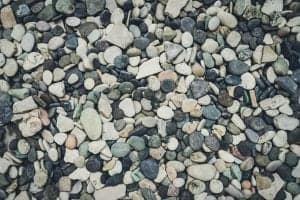
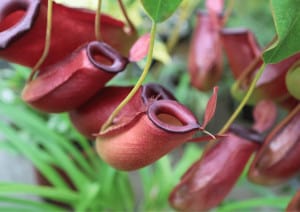

Pingback: Is My Rubber Plant Toxic To Cats? | Eden Indoors